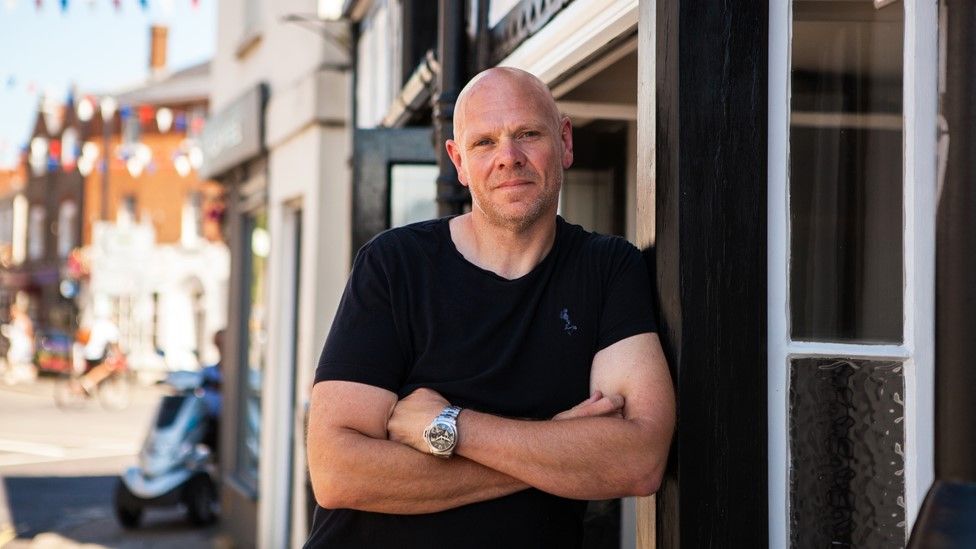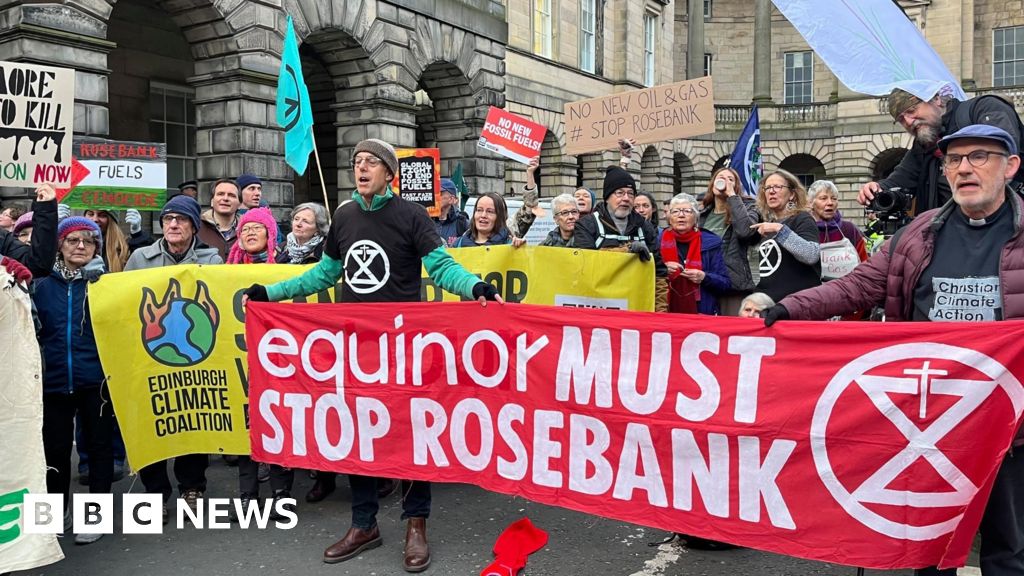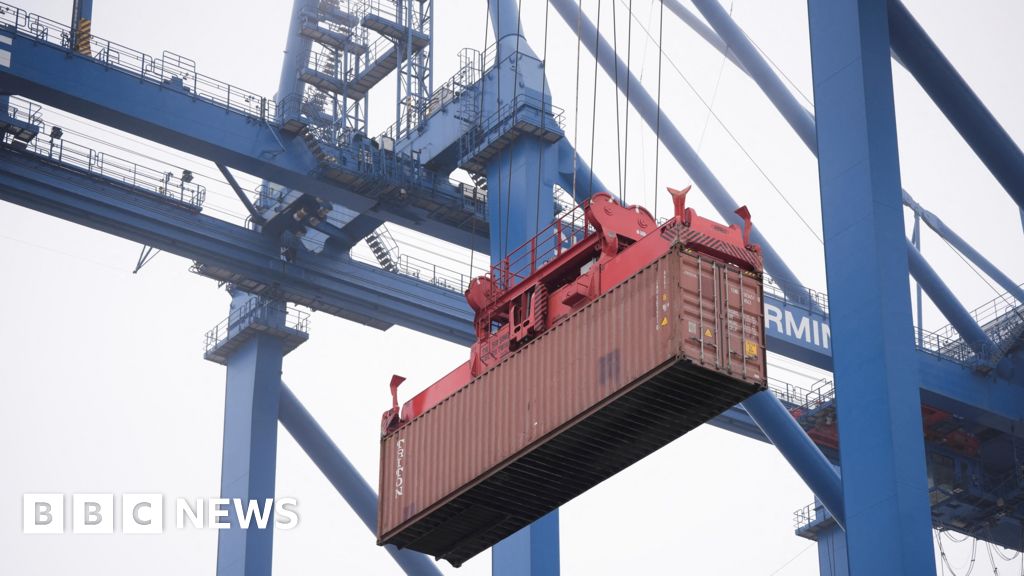ARTICLE AD BOX
 Image source, BBC/Bone Soup
Image source, BBC/Bone Soup
Since Covid, there hasn't been any respite for the hospitality industry, says celebrity chef Tom Kerridge. For his TV series he has been going behind the scenes at pubs and restaurants across the UK, as the industry he knows and loves is hit by a tidal wave of rising costs.
"There hasn't been any positivity or good news in three or four years," says Tom Kerridge. "Every day feels like you're walking uphill, on glass, barefoot."
Since the pandemic, there's been "absolutely no let-up" for hospitality venues, says the chef who runs six restaurants - including The Hand and Flowers, the only pub in the UK with two Michelin stars.
Kerridge, who has been running businesses for 18 years, says the various costs involved usually fluctuate independently but have now all risen at once, like a "huge wave".
These include energy bills, rent and mortgage repayments, food and insurance - even cleaning materials.
"There isn't a single thing that is cheaper," he says.
Energy bills in particular have been "catastrophically massive".
Restaurants use a lot of energy, from powering ovens and fridges in the kitchens to lighting front of house - making them expensive places to run. Kerridge was quoted a 600% increase on his energy bill for The Hand and Flowers.
Image source, Bone Soup/Edwin Hasler
Image caption,Kerridge opened The Hand and Flowers in Marlow in 2005
He says his venues now buy their energy on a monthly basis and are not signed up to any contract because prices are so variable. To save energy they are also not switching on lights outside and have changed to energy-saving bulbs and motion-sensor lights inside.
Just under a third of hospitality businesses felt optimistic about the next 12 months, according to a survey carried out on behalf of four trade industry bodies in May this year - the majority of the 395 businesses which responded were not feeling so positive.
Energy costs were one of the biggest concerns, with the average bill up 81% since last year and three times higher than in 2021.
The industry tends to operate on very tight profit margins, meaning there is not a lot of wiggle room between the amount made from sales and running costs.
This means businesses rely on a high volume of transactions to earn money, making them vulnerable to economic shocks, says Kate Nicholls, chief executive of UKHospitality.
With many hospitality businesses still in debt after the pandemic, the "tsunami of inflationary costs" is putting increasing pressure on these small margins, she says.
The sector has also had to withstand double-digit food price inflation.
"It is challenging, but we are a remarkably resilient industry," says Ms Nicholls.
Others featured in the new series, The Hidden World of Hospitality, have also overcome challenges in creative ways.
Bonnie Rowley runs Glaslyn ice cream parlour and pizzeria in Eryri, also known as Snowdonia. The business has been in her family since 1970.
Image source, BBC/Bone Soup
Image caption,In these challenging times Bonnie Rowley says it is harder to invest money back into her ice cream parlour
As well as seeing a huge jump in energy costs, food inflation has been a big problem, she says. She has had to adapt recipes as a result.
"We've had to discontinue making [a vegan raspberry sorbet] because raspberries are so expensive," she says. "We're now making a very lovely wild berry sorbet with raspberries in."
Her business is dependent on summer tourism, so she needs to make enough to survive winter.
"People will still treat their kids to an ice cream on holiday," says Ms Rowley. "Locals will still come out for a walk and an ice cream at the weekend. They might have a takeaway pizza on a Friday night you might share. We offer pizzas by the slice now as well."
Kerridge says a lot of venues are just "existing" - being busy just over the weekend doesn't necessarily mean turning a profit though.
This means pubs and restaurants are having to raise prices to stay afloat - just when customers, affected by the cost-of-living crisis, have less money in their pockets.
"We're stuck in this Catch-22 situation," says Kerridge.
Ms Nicholls says that while people are still going out to eat and drink, now they will have a spending limit in mind and are consuming less.
And because of the rise in homeworking, footfall is down, particularly for city-centre restaurants and coffee shops that rely on office workers.
Insurance is another rocketing cost and securing it can be "very difficult" now, says Kerridge. His insurance bill for The Hand and Flowers restaurant has risen from £26,500 to £51,500.
This, too, is a knock-on effect of the pandemic - closures and business interruptions mean hospitality is seen as "a slightly riskier sector", says Ms Nicholls.
Image source, BBC/Bone Soup
Image caption,Richard Ord (right) says everything has become more expensive, even food packaging
"We've never closed a single Good Friday since we opened in the 1920s - until Covid," says Richard Ord, who is the fifth generation to run Colmans fish and chip restaurant in South Shields. "Even World War Two didn't stop us."
When his customers couldn't come to the restaurant during Covid, he wanted to provide them with the same level of hospitality.
"Rather than outsourcing to an outdoor platform, we used our waiting staff and we got them to do the deliveries, so our customers were still seeing the waiters that served them."
His family have run the restaurant for 100 years, but Mr Ord says this is one of the hardest times he and others in the industry have faced.
Along with the increase in costs, there is a "huge staffing crisis", he says.
Many businesses are struggling to recruit workers. Recently Mr Ord has relied on finding people through word of mouth.
"It's nice to see that family-feel, that they want to bring their friends or family to work with them in the business."
According to the ONS, there were 129,000 vacancies in the hospitality sector between April-June 2023.
Kerridge says that although there are staff shortages globally, this is also "a legacy of Covid and Brexit" and has been made worse by restrictions on the movement of people from Europe.
But the market decline, says Ms Nicholls, could benefit entrepreneurs.
"It's a good opportunity for people to start a business and you are seeing, despite all the pressures, quite a lot of optimism coming through."
Kerridge is of similar mind - and despite the current pressures says he is "either wisely or stupidly" opening a new venue in London this year.
"I'm very much of the mindset that you lean into a problem rather than let it wash over you," he says.
"Other parts of the business, we're just battening down the hatches and trying to make it work."
Watch The Hidden World of Hospitality with Tom Kerridge on Thursday 3 August at 20:00 BST on BBC Two or catch up on BBC iPlayer.

 1 year ago
105
1 year ago
105








 English (US)
English (US)